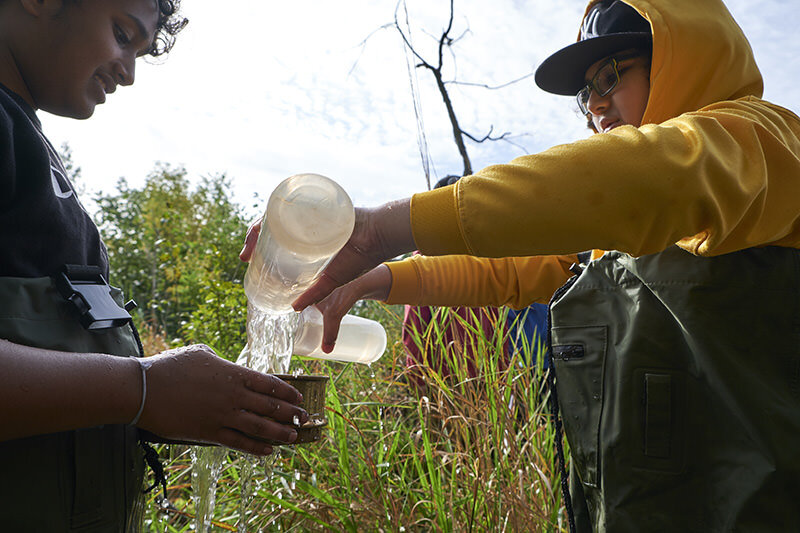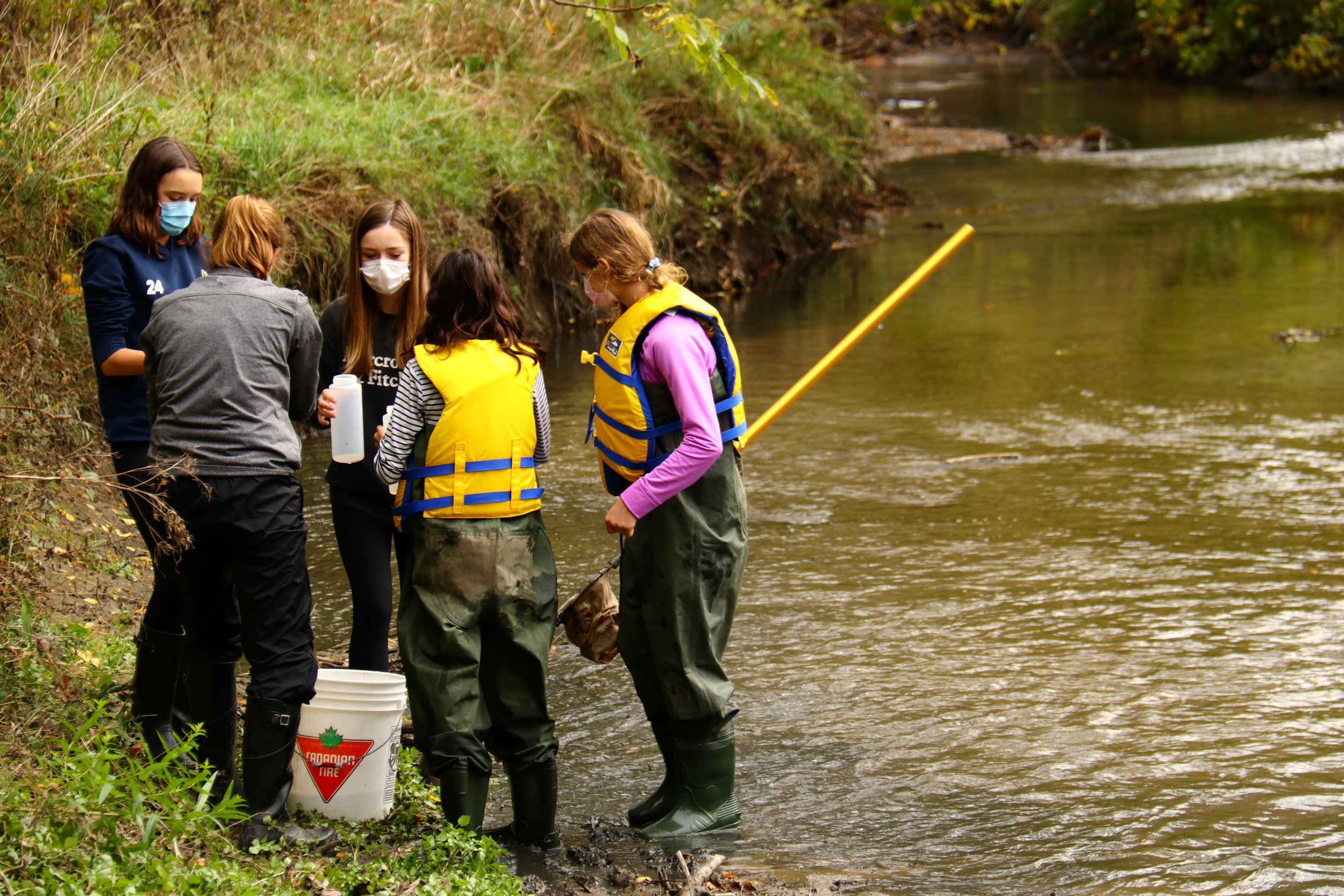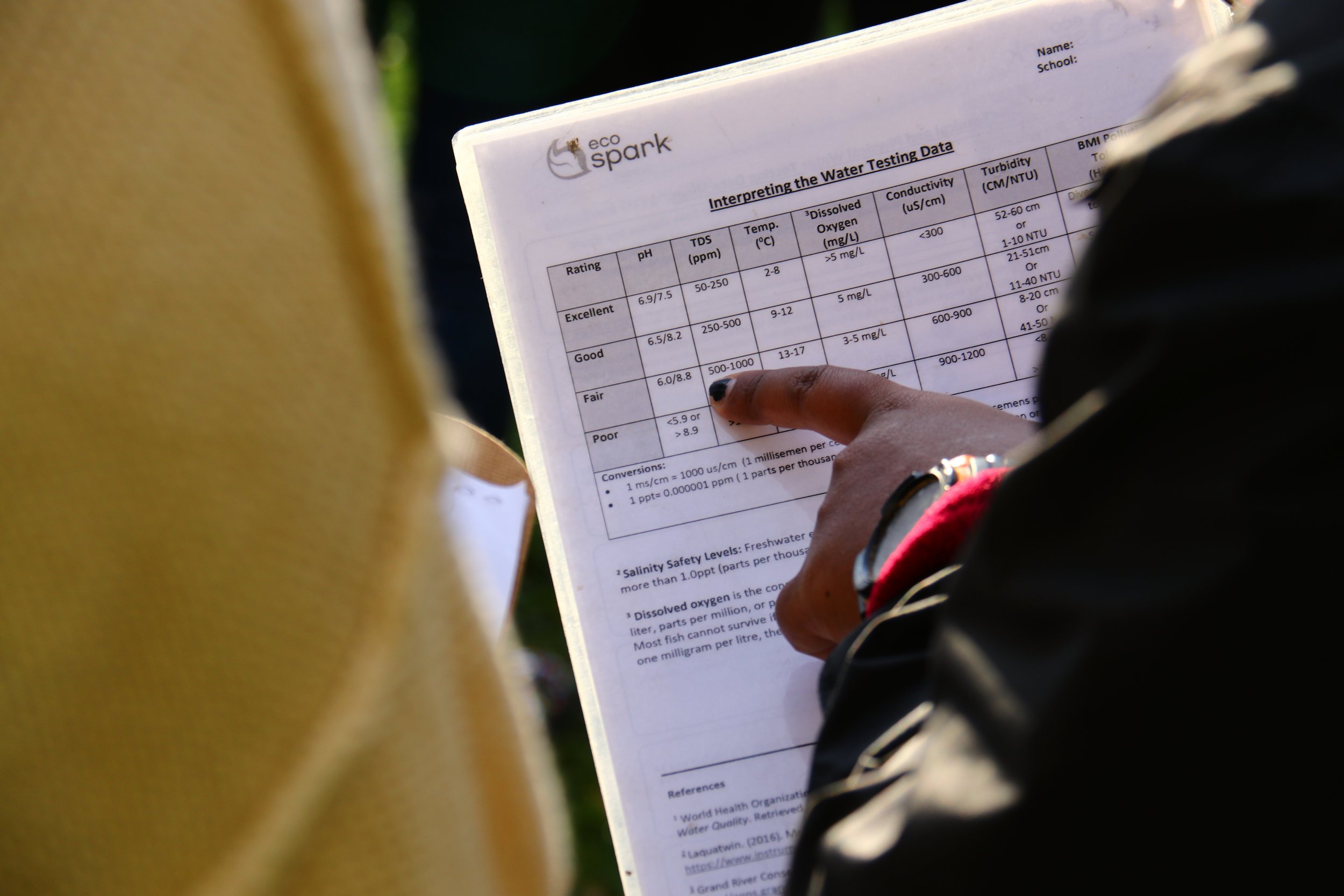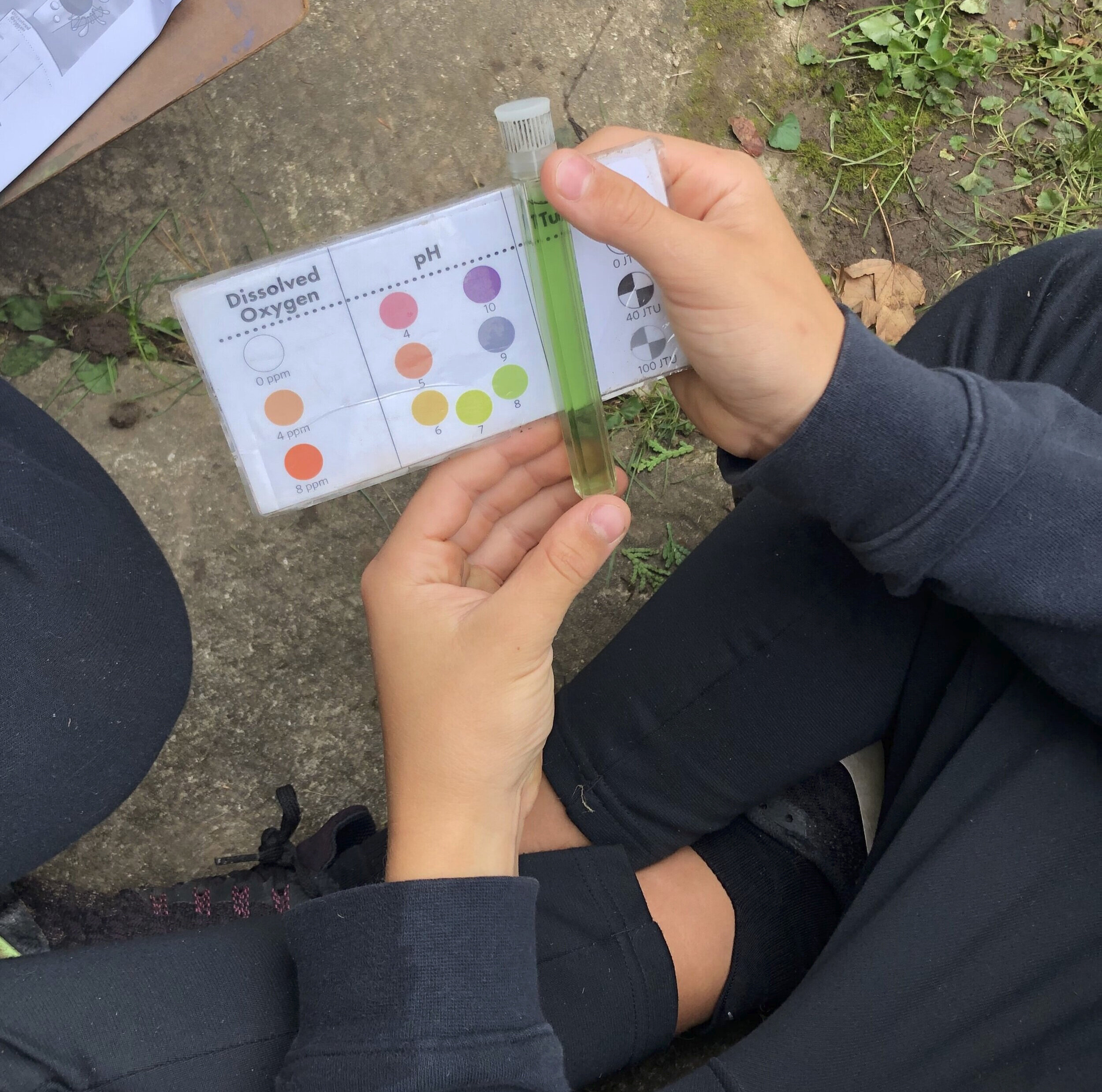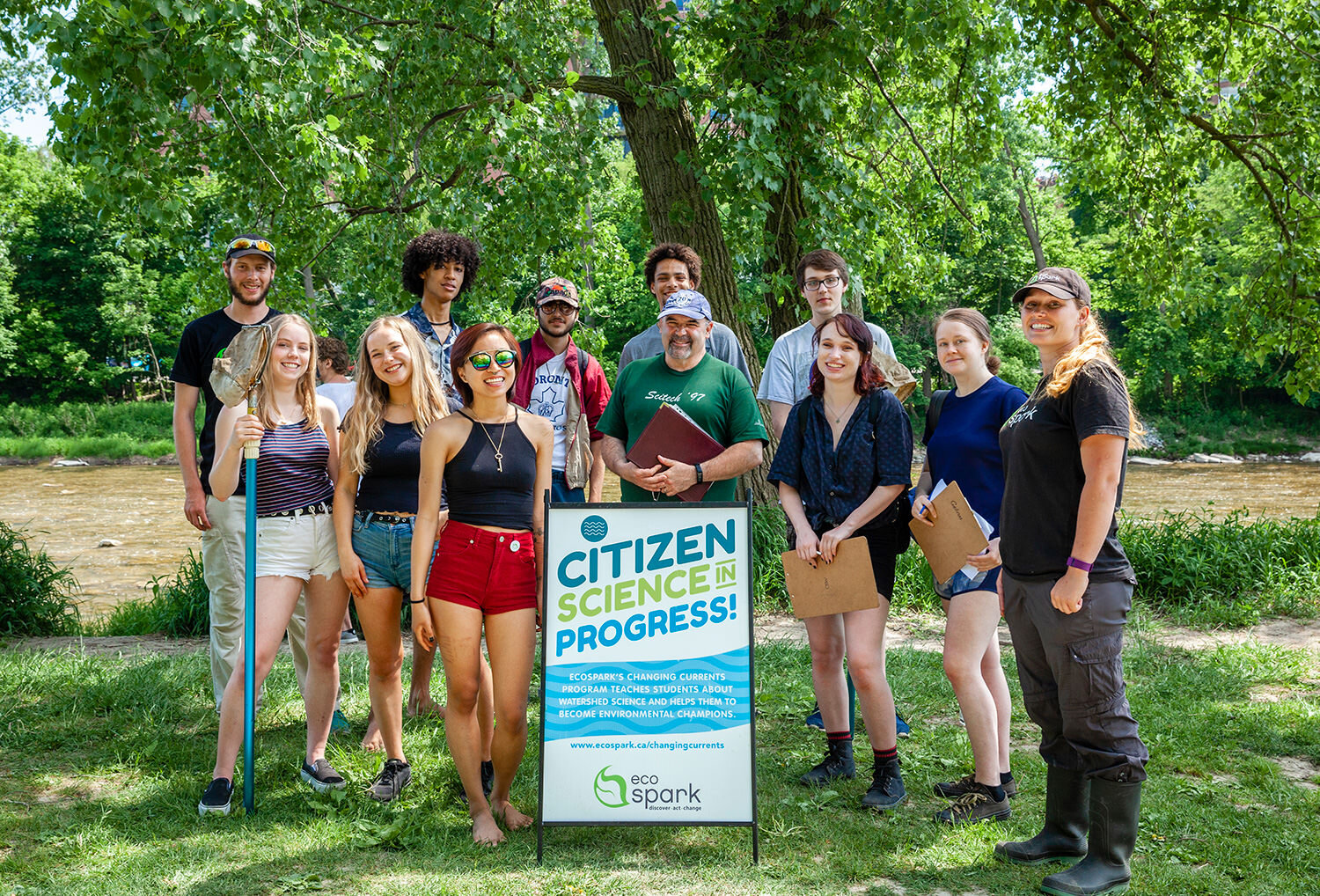

Changing Currents
explore your local aquatic ecosystems!
Important Update: Changing Currents is not currently booking new School sessions. Please Visit School Watch for Current Programs.
Student measuring wetted-width, a physical parameter collected as part of the Changing Currents protocol.
Changing Currents provides youth and community members in the Greater Toronto Area (GTA) with an inspiring citizen science based outdoor program, introducing them to the importance of watershed health and ecosystem management, to combat the impacts of climate change.
EcoSpark staff carefully showcasing a live female crayfish, with it’s clutch of eggs at it’s abdomen.
Health of local streams/rivers are assessed using EcoSpark's modified Ontario Benthic Biomonitoring Network (OBBN) protocol, to contribute accurate data to a GTA-wide study of watersheds, while educating participants on various “Take Action” activities during and/or following a session.
The OBBN protocol measures waterway health by monitoring various physical, chemical, and biological parameters such as benthic macro-invertebrates (BMIs)– small aquatic bugs – found in streams and riverbeds.
Data collected by participants is validated by EcoSpark’s OBBN-certified staff and made available to researchers and organizations monitoring and managing Ontario’s water quality.
SESSION TYPES:
Each session is limited to a maximum of 30 participants. See our Pricings and Policies page for more info.
Questions? Refer to our FREQUENT Q & A’S
Participants assess pollution tolerance levels of freshwater aquatic bugs known as Benthic Macroinvertebrates (BMIs)
IN-PERSON Sessions:
Wearing hip waders and life-jackets, participants join EcoSpark staff as they are guided into a local stream to safely work through the Changing Currents sampling protocol, gathering various physical, chemical and biological parameters. In-stream activities can be adapted to accommodate many participants with disabilities, contact staff for more details.
EcoSpark offers different in-person session workshops, of varying duration, for the Changing Currents program. Choose from the following options:
1. Half-Day Workshop
Duration: 2-2.5 hrs (morning OR afternoon)
Participants investigate chemical parameters like pH and salinity, to assess water quality.
Following a brief intro to citizen science and watershed science, participants are split into smaller groups and given specific roles of working from the stream bank or wading into the stream, to gather physical, chemical, and biological sampling data using scientific equipment provided by EcoSpark.
EcoSpark’s OBBN-certified staff then guide participants in sorting and identifying their biological specimens, to calculate population size and biodiversity, to assess water quality and watershed health. Finally, participants discuss and brainstorm ‘Take Action’ activities that they can do within their community, to make a positive impact to their local environment as well as towards mitigating climate change.
Participants engage in citizen science terrestrial monitoring activities to support biodiversity and contribute to climate research.
2. Full-Day Workshop
Duration: Full school day (morning AND afternoon)
A combination of EcoSpark’s Changing Currents program AND Park Watch program. This option combines a half-day of stream studies with an additional half-day citizen science activity offered through our Park Watch program.
Interactive apps, maps, and activities allow participants to collect citizen science data on plants and wildlife to support conservation and community awareness. Park Watch seasonal activities include:
Bird and Pollinator Studies
Tree Benefits
Community Mapping
3. Specialist High Schools Major (SHSM) Workshop
Duration: Full school day (in-field and classroom)
Students sort and identify BMIs to assess water pollution levels.
A specialized Changing Currents workshop for Environmental SHSM students to earn the “Introduction to Stream Assessment Protocol” certification (outlined in the SHSM Policy and Implementation Guide).
Students first partake in an in-field 2-2.5 hrs morning session, following the Changing Currents sampling protocol, to gather detailed environmental data from their local stream/river.
After a lunch break, students take part in an in-class 2-2.5hrs afternoon session, to analyze their results gathered from the morning. Students gain an understanding of how to conduct a water quality assessment, learn basic benthos identification, develop specific skills in identifying the taxonomic benthic groups, and use various indices to assess aquatic ecological health.
Program Location
Changing Currents takes place in local waterways, generally within 15 minutes walking distance or transit accessible. EcoSpark staff meet participants on site with all the required equipment needed to scientifically monitor the health of their local waterways.
EcoSpark staff monitor youth as they collect environmental data within a stream.
Staff work with organizers to select the most ideal stream/river location for study site options, with the help of EcoSpark’s Water Quality Dashboard and physical site investigations. Several days prior to a session(s), organizers are provided with all resources needed to prep their team.
Changing Currents is not currently booking school sessions. visit School Watch for curriculum-linked programs to serve grades 6-12. Thank you for your interest!
For more information or questions
changingcurrents@ecospark.ca
or 647-258-3280 x 2011
